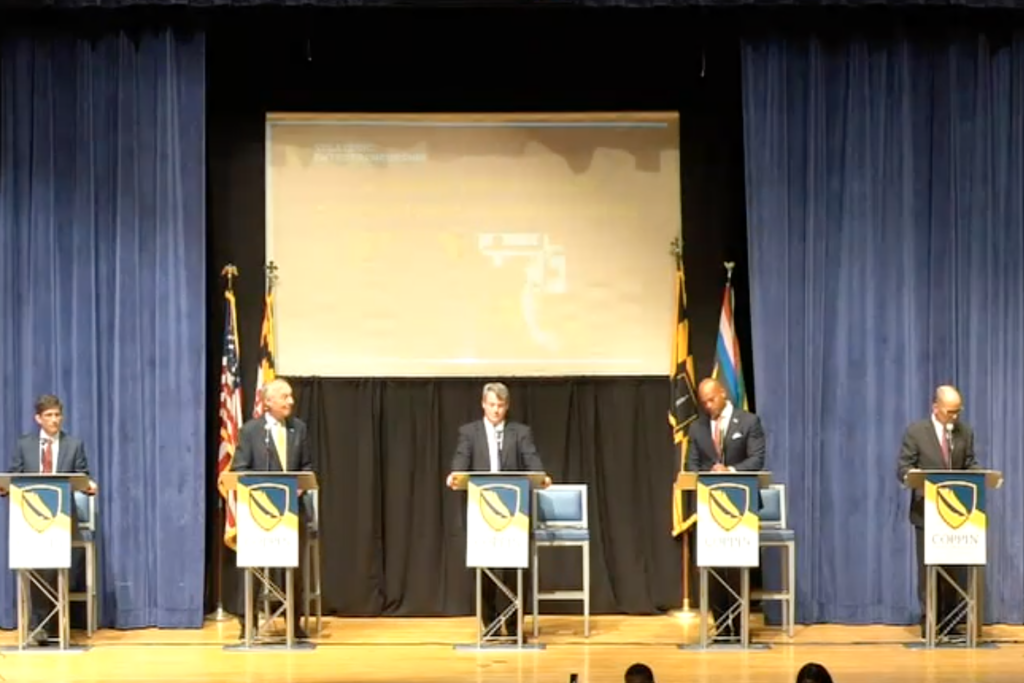This article was republished with permission from WTOP’s news partners at Maryland Matters. Sign up for Maryland Matters’ free email subscription today.

This content was republished with permission from WTOP’s news partners at Maryland Matters. Sign up for Maryland Matters’ free email subscription today.
Seven candidates in Maryland’s Democratic gubernatorial primary hailed the state’s historically Black colleges and universities as a remedy for inequity during a forum at Coppin State University on Tuesday.
“I just want to make sure the young graduates of Coppin are aware that they should be proud of this institution, and they should go out into the world and do things like run big companies or run for office,” said Maryland Comptroller Peter V.R. Franchot (D). “Do things that are important because the HBCUs are super important.”
Seven Democratic candidates pointed to adequate funding of Maryland’s historically underfunded public colleges as a way to cure the shortage in the health care workforce and inequity in education.
When addressing their plans to implement the Blueprint for Maryland’s Future education reforms, Wes Moore and former Maryland and U.S. Labor Secretary Tom Perez both said that Maryland’s student body overwhelmingly is not represented by the educators in their classrooms.
“In other words, our educators are disproportionately white,” said Perez. “Our students are disproportionately nonwhite,” said Perez.
Moore said that investing in all four of Maryland’s historically Black colleges and universities is imperative to make sure that students someday see themselves reflected in their classrooms.
Several candidates’ running mates attended historically Black colleges and universities.
Last spring, Maryland reached a $577 million settlement with its four historically Black colleges and universities, ending a 15-year federal lawsuit alleging that the state provided them with inequitable resources.
The General Assembly passed legislation in 2021 to require a steady flow of that funding to Morgan State, Coppin State, Bowie State and the University of Maryland, Eastern Shore over the next decade.
Additionally, billionaire MacKenzie Scott, the ex-wife of Amazon founder Jeffrey Bezos, donated $40 million to Morgan State, $25 million to Bowie State and $20 million to the University of Maryland, Eastern Shore in late 2020.
Now, university officials are planning how to best leverage that funding.
Candidates at Tuesday’s forum decried the lengthy process of fixing HBCU funding inequities in Maryland, saying that it took too long for the state to settle.
Former Prince George’s County Executive Rushern L. Baker III met his late wife when they were both students at Howard University. She went on to work for the United Negro College Fund after she graduated.
“I once asked her, what is the biggest issue that you face working with HBCUs … in terms of funding, and she said something that I think we should all take to heart: If we treated Bowie State, Coppin State [or] Morgan [State] like we treat the University of Maryland, College Park, we wouldn’t have to worry about a suit,” said Baker.
The forum, which also included Jon Baron, Doug Gansler and Jerome Segal, was largely cordial, with the Democratic candidates agreeing on a need to advance economic opportunities through transportation and access to education, focusing on Baltimore City.
The full forum can be viewed on the Coppin State Facebook page.







